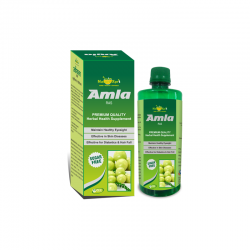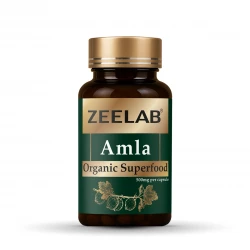Amla, also known as Indian gooseberry, is helpful for people with diabetes. It supports blood sugar control by helping the body use insulin more effectively. Amla contains chromium, a mineral that boosts how the body processes sugar. It also improves overall metabolism, making it easier to manage blood sugar naturally and stay healthy.
Amla (Indian Gooseberry) – Benefits, Uses, Dosage & Side Effects


Published On : 15 Jul, 2025
|
Written By : Himani Gupta
|
Reviewed By : Dr. Anubhav Singh
Amla, or Amalaki, is Ayurveda’s top rejuvenating and healing herb. Rich in Vitamin C and antioxidants, Amla is widely recognized for its immune-boosting, anti-aging, and detoxifying properties. This small green fruit balances all three doshas—Vata, Pitta, and Kapha—making it a core component in many Ayurvedic formulations. It strengthens the body's natural defenses, supports digestion, improves skin and hair health, and revitalizes overall energy levels, earning its place as a daily Rasayana in Ayurveda.
Key Components of Amla:
- Vitamin C: Strengthens immunity and reduces oxidative stress.
- Tannins & Polyphenols: Offer anti-inflammatory and antimicrobial effects.
- Gallic Acid: Acts as a powerful antioxidant and cellular protector.
- Emblicanin A & B: Unique compounds that delay aging and rejuvenate tissues.
- Flavonoids: Support heart health and fight free radicals.
- Fibers & Pectin: Improve digestion and support gut health.
These components make Amla a natural remedy for multiple health concerns, from immunity to metabolism.
Importance of Amla in Ayurveda:
Amla holds a sacred and vital place in Ayurveda due to its Rasayana (rejuvenating) properties. It improves vitality and strength. Amla enhances longevity, boosts mental clarity, and builds resistance to diseases. Due to its cooling effect, it pacifies Pitta dosha, while its nourishing nature balances Vata and Kapha. It’s an integral part of famous Ayurvedic medicines like Chyawanprash, Triphala, and Brahma Rasayan. Its daily intake is recommended for maintaining youthfulness, digestive strength, and mental sharpness.
Benefits of Amla:
Amla for Low Immunity:
Amla is packed with natural Vitamin C, which boosts white blood cell function and strengthens immunity. It helps the body fight off infections, colds, and viral illnesses. Its antioxidant content also helps flush out toxins and reduce oxidative stress, keeping the immune system resilient.
Amla for Indigestion:
It stimulates digestive enzymes and supports healthy bowel movements. Its high fiber and pectin content help relieve constipation, bloating, and acidity. It strengthens the digestive fire (Agni) and cleanses the colon, making it a gentle yet effective remedy for gut health.
Amla for Hair Problems:
Traditionally used in hair oils and tonics, Amla nourishes hair roots, prevents premature greying, and strengthens strands. Its cooling and antioxidant-rich nature improves scalp circulation and promotes healthy hair growth while reducing dandruff and dryness.
Amla for Dull Skin:
It maintains skin firmness, making it youthful and giving a glowing skin appearance. Its detoxifying properties help reduce acne, pigmentation, and dullness. Regular intake can result in naturally clear, smooth, and radiant skin.
Amla for Heart Problems:
Amla helps reduce bad cholesterol and supports healthy blood pressure levels. The polyphenols and flavonoids in Amla strengthen cardiac muscles and improve blood flow, thereby reducing the risk of heart diseases. It also protects the blood vessels from oxidative damage.
Amla for Eye Problems:
Rich in carotene and Vitamin C, Amla supports better vision and reduces the risk of cataracts. It soothes eye irritation and can even help in delaying age-related eye conditions. Amla is often used in traditional eye tonics and Rasayanas.
Amla for Diabetes Control:
Also Read - Sugar Ayurvedic Medicine
Amla for Low Memory:
Amla is known to enhance memory, concentration, and mental clarity. Its antioxidants protect brain cells from degeneration and improve neurotransmitter function. Regular use supports a calm mind and emotional balance.
How to Use Amla?
Amla is taken as juice, powder, or capsule—usually 1–2 tsp with warm water on an empty stomach. Always follow the dose suggested by an Ayurvedic expert.
When to Use Amla?
- During seasonal changes to boost immunity
- For improving skin, hair, or eye health
- When facing digestive issues or acidity
- As a daily supplement for rejuvenation
- In cases of high cholesterol or sugar levels
- For enhancing memory and brain clarity
How Does Amla Work?
Amla works through its potent antioxidant and anti-inflammatory actions. It reduces cell damage, enhances collagen, and neutralizes harmful free radicals. Its Rasayana effect improves digestion, strengthens immunity, nourishes tissues, and regulates metabolic functions. Amla promotes detoxification through the liver and kidneys, supports hormonal balance, and revitalizes cells from within.
Who Should Use Amla?
- People with low immunity or frequent infections
- Those with dull skin or hair fall issues
- Individuals managing cholesterol or diabetes
- People with poor digestion or acidity
- Elderly individuals seeking anti-aging support
- Anyone aiming for daily wellness and vitality
Safety Measures:
- Use within recommended limits to avoid excess cooling
- Consult a doctor if pregnant or on medication
- Store in a dry, cool place away from sunlight
- Not recommended for people with sensitive stomachs without supervision
- Best used under Ayurvedic guidance for desired results
Conclusion:
Amla is a time-tested Ayurvedic wonder known for its broad-spectrum health benefits. From digestion and immunity to skin, hair, and heart health, this green fruit is a powerhouse of wellness. Its ability to rejuvenate tissues, detoxify the body, and strengthen the mind makes it a must-have daily supplement. Regular use of Amla under expert supervision promotes long-lasting vitality, internal balance, and overall well-being.
Frequently Asked Questions (FAQs):
Q: Can Amla be taken every day?
A: Yes, daily intake in the right dose boosts immunity and wellness.
Q: Does Amla help in weight loss?
A: Yes, it improves digestion and metabolism, supporting healthy weight management.
Q: Is Amla good for children?
A: Yes, in small, age-appropriate doses, it strengthens immunity and promotes growth.
Q: Can Amla be consumed at night?
A: It’s best taken in the morning, but a mild dose at night is also safe.
Q: Does Amla cause acidity?
A: No, it reduces acidity due to its cooling and balancing nature.
Emblica Officinalis Extract (Amla Powder) 500mg
100 Capsules per jar
Delivery in 3 to 5 days
30% off
Recent Blogs
Disclaimer : Zeelab Pharmacy provides health information for knowledge only. Do not self-medicate. Always consult a qualified doctor before starting, stopping, or changing any medicine or treatment.


















 Added!
Added!